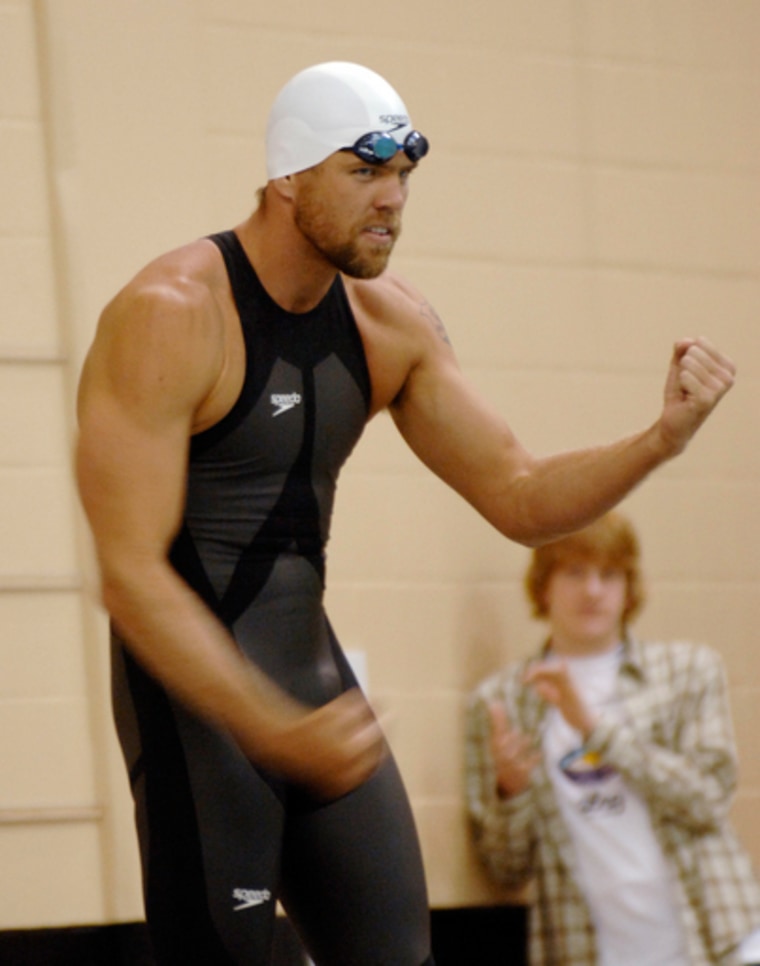Gary Hall Jr. isn’t going to make a stink about getting on the 400-meter freestyle relay this time. But the two-time defending Olympic 50 free champion is still stirring things up.
Hall is aiming to make his fourth Olympic team at age 33 and defend the sprint titles he won in 2000 and 2004. He typically disappears between Olympics, rarely participating in any of the major meets.
But Hall resurfaced at the U.S. trials Sunday, expressing concern and frustration about what he believes is the use and effect of performance-enhancing drugs in swimming. The sport has not had any drug scandals in recent years, unlike track and field and baseball.
“To think that it doesn’t exist is foolish,” Hall said. “All doping scandals are not a direct result of positive tests. They’re usually somebody getting caught by some other means. I don’t think that we can rely on a doping agency to really catch the people that are so far ahead of where the testing is.”
Hall said he was speaking out because he’s worried about the future of a sport he began in as a youngster. He said the public suspicion directed toward many of today’s athletic accomplishments “can be very depressing and it has been very frustrating for a lot of clean athletes.”
He mentioned the 1976 Montreal Olympics, where the East German women piled up gold medals. They were later found to have cheated through steroid use, but at the time they credited their world records and success to the type of swimsuit they wore.
“Clearly we know now it wasn’t the suit that was causing all these world records to be broken. It was copious amounts of steroids,” Hall said. “Can the suit technology distract from another issue? I think it’s pretty convenient for those that are indulging the other issue.”
High-tech swimsuits are the talk of the U.S. trials, with some swimmers scrambling to wear the latest versions that have produced a string of world records this year, including two more Sunday night.
Hall cited disgraced Olympic champion sprinter Marion Jones as someone who never tested positive, but is currently in prison after pleading guilty to lying about her performance-enhancing drug use.
He also invoked the name of six-time Olympic gold medal swimmer Amy Van Dyken, who in 2003 was one of dozens of athletes appearing before a federal grand jury probing BALCO.
“She’s inducted into the International Swimming Hall of Fame and the U.S. Olympic Hall of Fame, and Marion Jones goes to jail,” Hall said. “The only difference was that Marion Jones admitted it, but they were both on the same list.”
Van Dyken won four gold medals at the 1996 Atlanta Olympics and two more in 2000, when she and Hall were teammates in Sydney. Now retired, she serves as an assistant swim coach at Notre Dame Prep in Scottsdale, Ariz.
“It is ridiculous that Gary would say something like that. It’s slanderous, outrageous, and unfounded!!!” Van Dyken wrote in an e-mail to The Associated Press on Sunday night.
“Everything I’ve ever worked for in my swimming career, I did through hard work for my country. I earned every medal I ever won. To be mentioned in this context is upsetting, especially from a fellow swimmer and former teammate.”
Hall acknowledged he has no positive drug tests to back up his comments.
“Unfortunately, we rely on an inadequate doping system and doping agencies for the proof,” he said. “We live in a society where innocent until proven guilty, the key word being proven, and we don’t have any way of proving these people are cheating. We never did.”
Hall called for the World Anti-Doping Agency to create a list of allowed supplements instead of just the current list of what is banned.
He said calling the WADA hot line and asking if a certain supplement is acceptable gets the same response: take it at your own risk.
“There’s not an OK list, maybe we should create an OK list,” Hall said. “It would make it a lot easier for the athletes. It certainly doesn’t help the athletes that are kind of in the dark on these things.”
In an effort to be transparent, Hall said he takes amino acids, protein supplements and creatine, which helps supply energy to muscle and nerve cells.
“The attitude of the clean athlete today is that, ’I have to take everything that I can that’s legal to be able to compete,”’ he said. “There’s a lot of people kind of looking for that next great product from the supplement industry that will give them a little bit of an edge.”
Most of all, Hall said, he wants behind-the-scenes talk of performance-enhancing drugs brought into the open.
“Maybe the solution starts with just talking about it,” he said.
